12月9-10日,美国政府纠集召开“民主峰会”,借民主之名,打着反对“威权”的旗号,一心想要组建“民主同盟”,通过突出意识形态分歧,拉帮结派,分裂世界,服务于其维持美国霸权的目的。会议召开之前和会议伊始,就出现不少批评的声音。
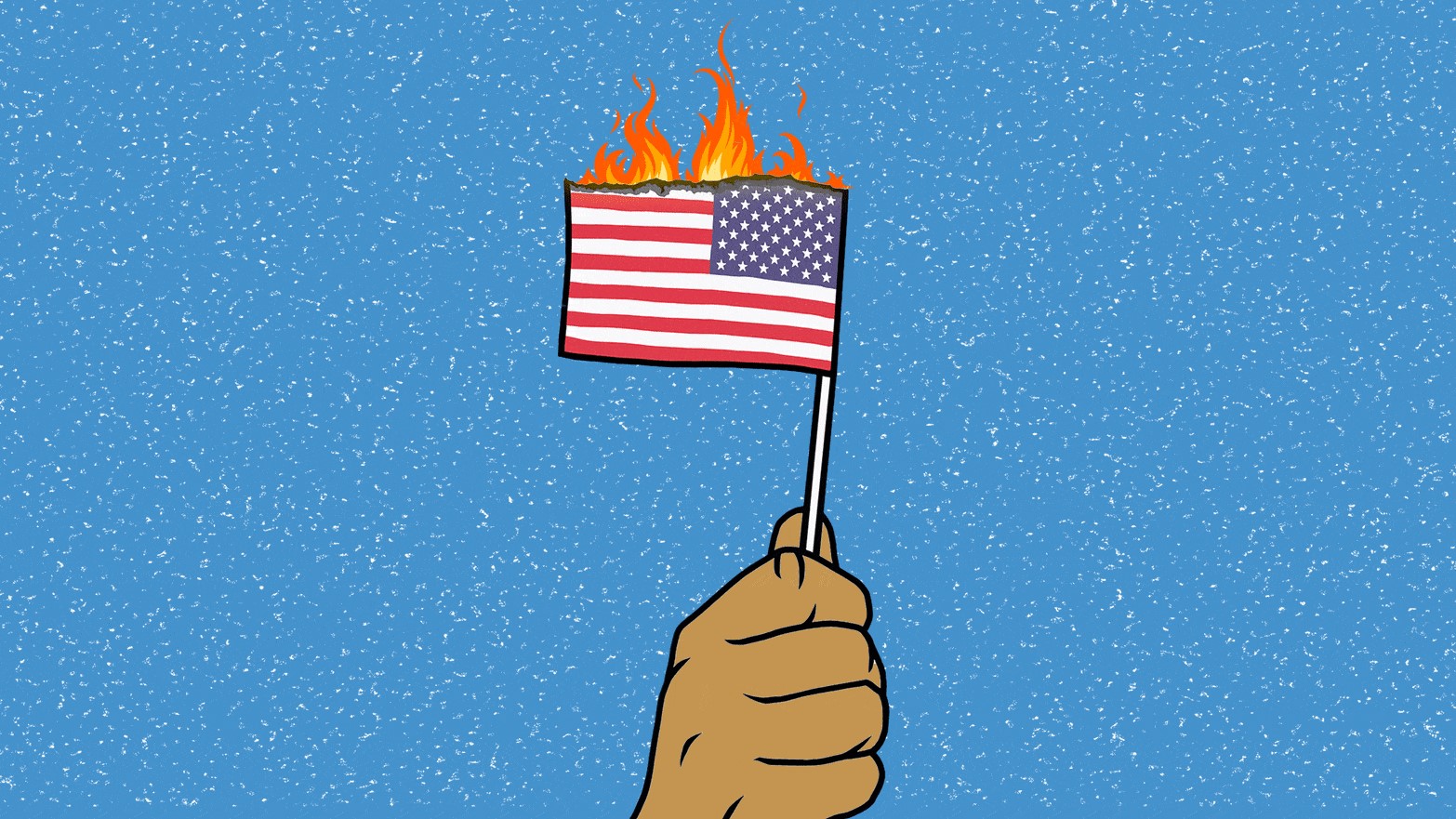
(图片来源:The Daily Beast)
一、峰会名单更像是官僚体制和各组织间制造的“香肠式”产物,并不象征崇高。受邀的不少国家的民主记录并不良好。美国召开此会的主要目的是追求更广泛战略利益,服务于美国的竞争战略。没有邀请被视为“竞争对手”的中国和俄罗斯,说明拜登总统任期内的重点放在所谓的“民主”竞争上。中国表示该峰会站在民主的对立面,不利于全球团结合作,更不利于全球发展。
The summit, which convenes leaders from 110 countries, has already drawn criticism for a questionable guest list. For an event that is focused on countering authoritarianism, many of the invited countries—Pakistan, the Philippines, Poland, and Iraq, to name a few—have decidedly poor democratic track records. The lack of an invite can also be contentious: Hungary, a NATO ally and the only European Union country not invited, has called its exclusion “disrespectful”.
(Dec. 9, 2021, Foreign Policy, Will the Summit for Democracy Change Anything?)
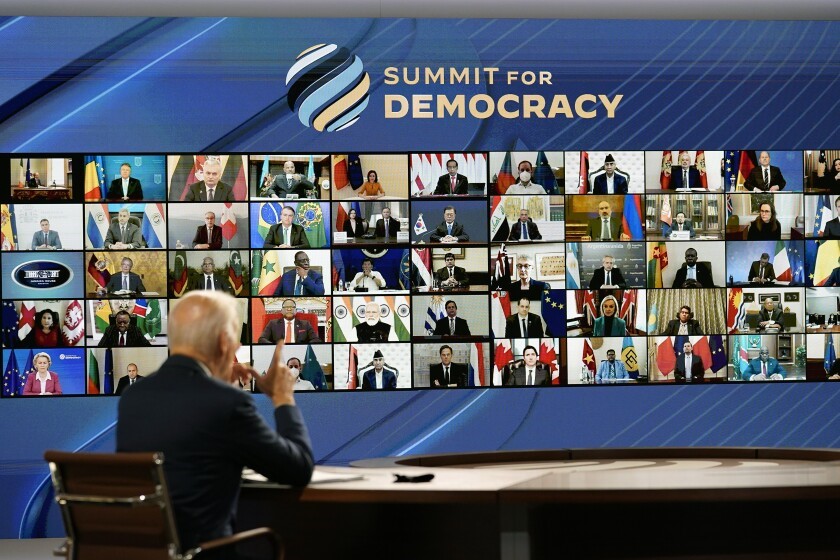
(图片来源:Los Angeles Times)
The result is a tangle of contradictions and missed opportunities. India (67), Brazil (74) and Poland (82) have all slipped down the Freedom House rankings in recent years, yet they were too politically significant to be left off the list. Bosnia and Herzegovina (53) ranks just behind its Balkan neighbour Kosovo (54) and could use American support at a time of increasing political polarisation, but was not invited. America’s own score has fallen, from 86 in 2019 to 83 in 2020, placing it behind 60 other countries. With luck Mr Biden will be among those reporting improvements next year.
(Dec. 6, 2021, The Economist, Joe Biden’s Summit for Democracy is not all that democratic)
Combining Freedom House’s index scores with tallies from the Varieties of Democracy (V-Dem) project yields revealing results. Eight invitees fall exceptionally low on these democracy rankings, raising troubling questions about their invitations: Angola, the Democratic Republic of the Congo, Iraq, Kenya, Malaysia, Pakistan, Serbia, and Zambia. Four additional invitees prompt serious backsliding concerns due to heightened levels of autocratization or big declines in freedom of expression over the past ten years: Brazil, India, the Philippines, and Poland.
When it comes to regional representation, Europe leads the world with thirty-nine invitees, followed closely by twenty-seven participating countries from the Western Hemisphere. The Asia Pacific and Sub-Saharan Africa also enjoy robust participation with twenty-one and seventeen invitees, respectively. In contrast, the Biden administration extended invites to fewer countries in the Middle East and North Africa and South and Central Asia. In the Middle East, only Iraq and Israel received invitations, while South and Central Asia obtained just four invites (for India, the Maldives, Nepal, and Pakistan).
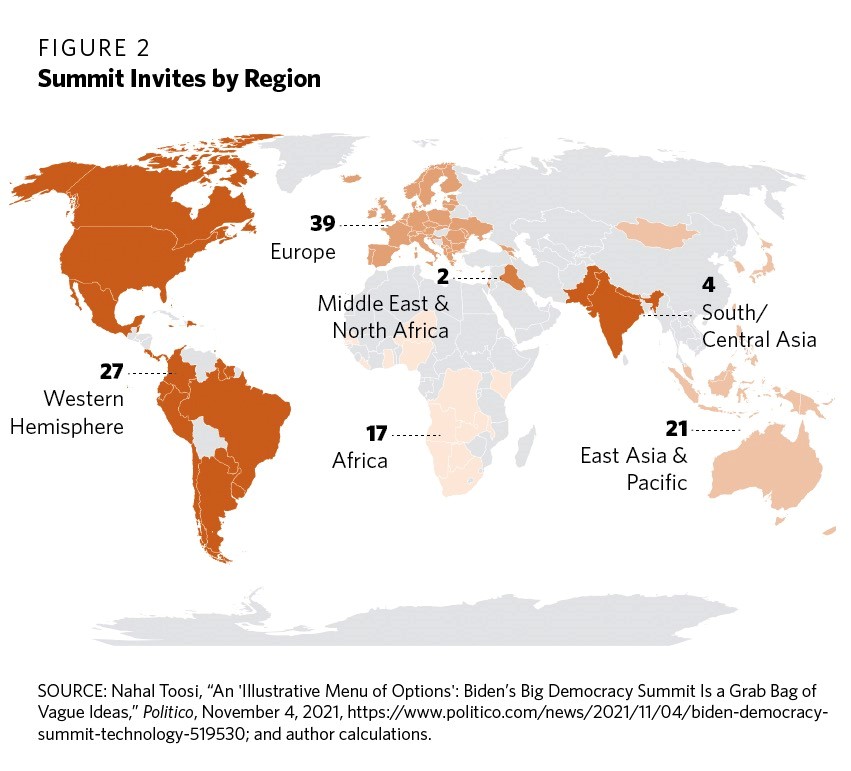
(图片来源:Politico)
Identifying the participants for such a major diplomatic gathering is a complicated process, and settling on the final summit list was more a product of bureaucratic and interagency sausage making than anything more sublime.
(November. 22, Carnegie Endowmennt for International Peace, Who's In and Who's Out From Biden's Democracy Summit)
“It claims it’s doing this for democracy,” Le said, without naming the United States. “But this is in fact the very opposite of democracy. It will do no good to global solidarity, no good to cooperation and no good to development.”
Biden has made a competition between democracies and autocracies such as Russia and China a central theme of his presidency, saying democracies must prove they can deliver. Neither Russia nor China are invited to his summit.
Bonnie Glaser, a China expert who is director of the Asia Program at the German Marshall Fund of the United States, said the Chinese are correct in viewing the summit as a pushback against autocracy and China’s political system.
(Dec. 3, 2021, Associated Press, China, US tussle over Biden’s ‘Summit for Democracy’)
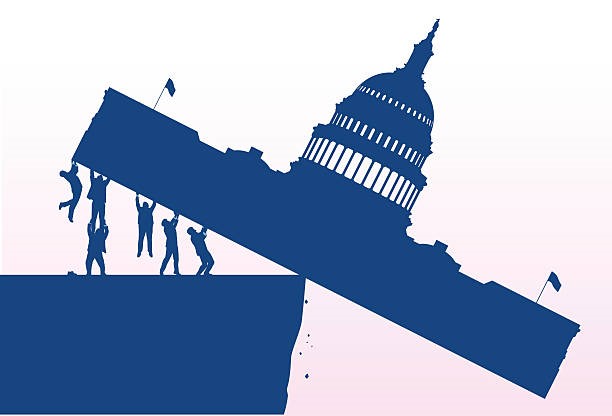
(图片来源:Gettyimages)
二、从前总统乔治·布什到比尔·克林顿,美国领导人推行的自由主义口号从来都不是为了大幅提高全世界人民生活水平。财阀统治导致美国工人阶级陷入贫困,让国内越来越多的财富集中于极少数人手中,然后转头指责中国。“民主峰会”非但没有在世界范围内传播和平,反而造成新的意识形态分裂,冷战思维再现。
Biden is hardly the first U.S. president to work to promote democratic values, seeming to divide the world — intentionally or not — into actors good and rogue. Ronald Reagan had his “Evil Empire” (the Soviet bloc), and George W. Bush had his “Axis of Evil” (Iran, Iraq and North Korea) in the global fight against terrorism.
Even local or state-level events, such as a Republican-led overhaul of the electoral process in Wisconsin, have prompted alarm among democracy activists.
Laura Thornton, director of the Alliance for Securing Democracy at the German Marshall Fund of the United States, warned in a Washington Post op-ed Saturday that the United States would not tolerate behavior like Wisconsin’s in another country.
“If this occurred in any of the countries where the United States provides aid, it would immediately be called out as a threat to democracy,” wrote Thornton, who spent more than two decades overseas working on democracy and election issues. “U.S. diplomats would be writing furious cables, and decision makers would be threatening to cut off the flow of assistance.”
(Dec. 7, 2021, The Washington post, Biden’s ‘Summit for Democracy’ includes countries that hardly seem to qualify)
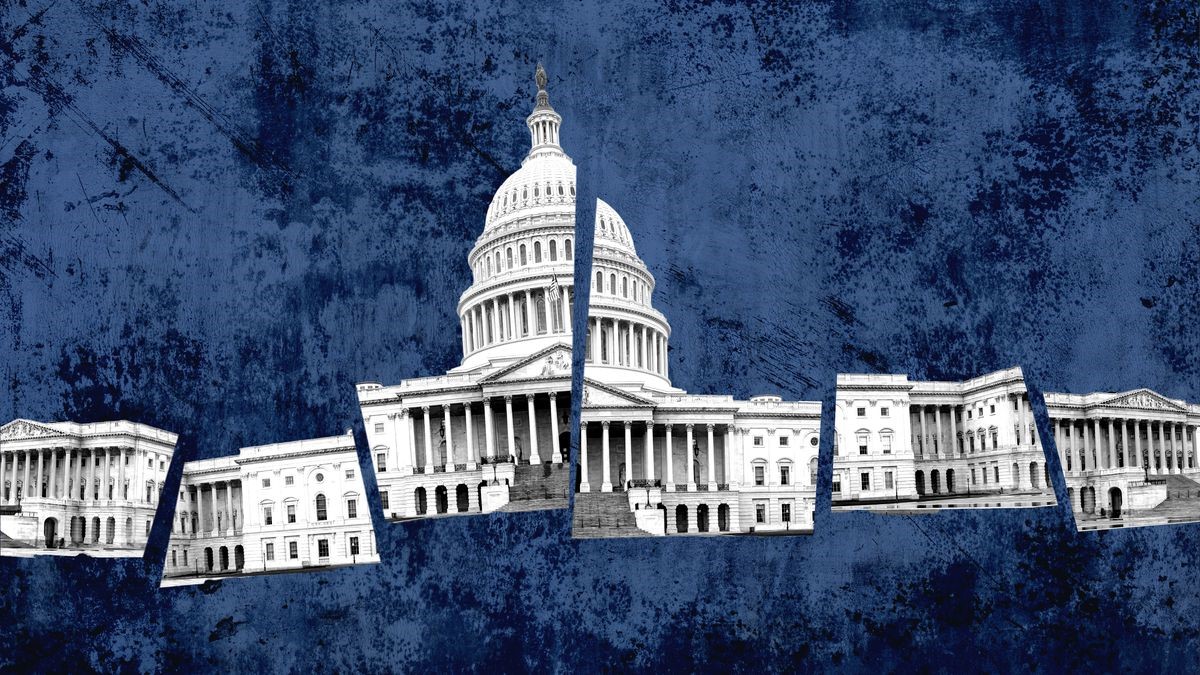
(图片来源:DesertNews)
American democracy is at the precipice and its weakest place since the Civil War, at this point what we're seeing is a coordinated attack on democracy at all levels.
(Dec. 9, 2021, Wbur-FM, As Biden hosts Summit for Democracy, the U.S. democratic experiment faces its own perils)
The mantra of free trade pushed by US leaders from former presidents George H.W. Bush to Bill Clinton was never about generously raising the standard of living of people around the world. It was always about impoverishing the American industrial working class and then blaming China for it, while inconceivable quantities of wealth concentrated in fewer and fewer hands at home.
The "Summit for Democracy", the latest brainchild of the delusionary ideologues who pose as "strategic planners" in Washington's Beltway, is another example of this remorseless descent into madness. It is not a summit for democracy at all. It is not a gathering intended to bring peace on Earth and goodwill to all humans.
Far from spreading "peace" around the world, the "Summit for Democracy" will create monstrous new ideological divisions. It will be used as a stepping stone to divide the world even more catastrophically than the Cold War did. Except that the new "Cold War", by its very nature, will be engineered to turn into a hot war.
(Dec. 7, 2021, ChinaDaily,'Summit for Democracy' selling a lie)
三、美国已经失去信誉。拜登的支持率在下降,美国国内的民主规范不断被削弱,党派极化愈加严重,这种分化超越政策差异,带来种族与文化上的生存冲突。美国人权组织和民间社会团体对峰会能否真正解决国内民主困境持怀疑态度,担心美国政府仍像往常一次又一次召集各国开会,口惠而实不至。
Critically, even the host of the summit has plenty of problems at home. After all, the gathering is taking place at a time when the American right wing itself is deeply divided over the benefits of liberal democracy. Many conservatives think America’s multiracial, multicultural national identity is just one more illusion to be dispelled, and the Constitution an optical obstacle to overcome.
(Dec. 9, 2021, Politico, Democracy is in trouble, and Biden’s summit is not going to fix it)
“The United States has lost credibility; there’s no question about that,” said James Goldgeier, a professor of international relations at American University and a former National Security Council aide in the Clinton administration. In a recent essay for Foreign Affairs, he argued that Mr. Biden should instead hold a democracy summit at home — one focused on “injustice and inequality” in the United States, including issues like voting rights and disinformation.
“If you have total gridlock on Capitol Hill and you don’t have the ability to get things done to improve people’s lives, you’re not going to command a lot of moral authority,” Mr. Goldgeier added.
“How can the United States spread democracy or act as an example for others if it barely has a functioning democracy at home?” Emma Ashford, a senior fellow at the Atlantic Council, wrote in Foreign Policy this month. “Washington’s foreign-policy elites remain committed to the preservation of a three-decade foreign policy aimed at reshaping the world in America’s image. They are far too blasé about what that image has become in 2020.”
(Feb.3, 2021, The New York Times, As Biden Plans Global Democracy Summit, Skeptics Say: Heal Thyself First)

(图片来源:The New York Times)
Biden's approval ratings have been drifting lower, as a fierce partisan divide remains in the country over issues such as how to address the COVID-19 pandemic, inflation, border security, employment and how elections should be conducted.
The US was recently listed among "backsliding democracies" in a report by the International Institute for Democracy and Electoral Assistance in Stockholm. In the US, there has been a decline in "effective parliamentary representation" and diminished freedom of expression, association and assembly, IDEA said.
"Its democratic norms are continuously weakened and extremely rooted in extreme partisan polarization which is beyond policy differences but an existential conflict over race and culture," Rosario Malindog-Uy wrote.
(Dec. 7, 2021, China Daily, 'Summit for Democracy' not without hypocrisy)
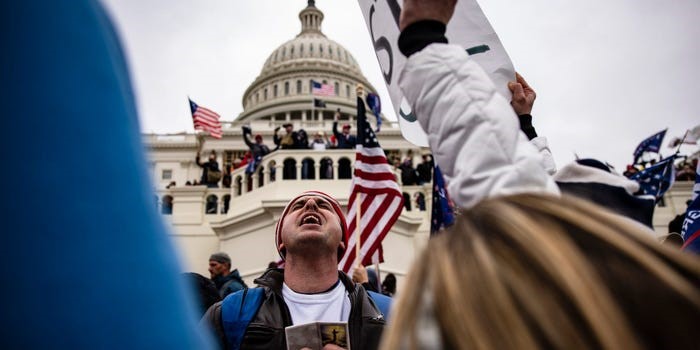
(图片来源:Gettyimages)
“The idea of the United States convening the world's democracies to talk about democracy raises the question of whether the United States should lead on something like that,” Eric Bjorklund, president of Democracy International, a group that promotes government
accountability and free, legitimate elections told.
“Because we now have a situation where a substantial part of one of our political parties doesn't appear to believe in democracy and is willing to try to overturn elections.” A common refrain among human rights organizations and civil society groups was the hope that the summit will do more than simply offer leaders the opportunity to speak in favor of democratic values without holding them accountable for actually implementing them.
"We think that the summit needs to be a place of honesty, humility and true commitment to working through the issues, the human rights issues that are faced by countries around the world, including the United States of America,” Joanne Lin, national director for advocacy and government relations at Amnesty International USA said.
"It’s a question of whether or not the summit is actually going to be the launching point for meaningful multilateral engagement and challenge or whether it's going to be more of a one-off event that convenes governments virtually but doesn't actually have meaningful accountability afterwards.”
(Dec. 5, 2021, VOA, Activist Groups Take Cautious Approach to White House Democracy Summit)
四、被美国推行民主的国家内的民主在衰落,美国应该修正推销民主的观念并改变美国从中的角色,拜登政府应该更多地关注国内的民主问题。“民主”一直是美国维持和推进其全球霸权的遮羞布,华盛顿峰会是美国民主出现大问题的征兆。
Now, it’s fair to say democratic backsliding has mostly domestic causes in those US-allied countries, so you can’t blame it all on Uncle Sam. But what we do need to establish is that countries close to the US have experienced the most democratic decline; those closer to China, Russia and Iran have not. At the very least, we need to revise long-held assumptions about the spread of democracy and the US role in it.
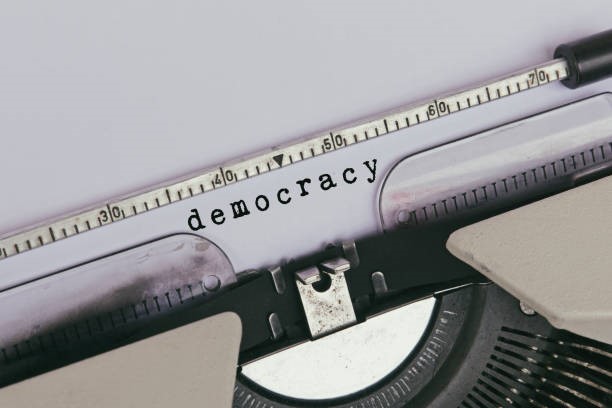
(图片来源:Gettyimages)
Democracy itself is backsliding in the US and it is no model to anyone. A new survey of 18 to 29 years of age young American group by the Institute of Politics at the Harvard Kennedy School finds more than half believe US democracy has either “failed” or is “in trouble”.
About 35 per cent thought there could be a second civil war in their lifetime, while a quarter said there could be a US state seceding within their lifetime.
Meanwhile, 39 per cent described the country as a “democracy in trouble” and another 13 per cent of called it a “failed democracy”.
Of the more than 2,100 young Americans surveyed, only 7 per cent believed the US was a “healthy democracy”, while another 27 per cent considered it a “somewhat functioning democracy”.
Members of this generation of young Americans are not only the most educated but also among the most economically disadvantaged. They can see that many other countries, democratic or not, western or eastern, offer a much better deal to their citizens than their own government and society.
If democracy needs improvement or to be shored up, there is much work to be done at home rather than aboard.
Overseas, for many foreigners including yours truly, “democracy” has been the fig leaf for the US to advance and maintain its global hegemony. Even if its interventions abroad were sincere, the imposition of democracy by force has generally been a failure. It has destabilised more countries and societies than freeing them. And those few cases of undoubted success, such as post-war Japan, Germany and South Korea may have more to do with their own domestic developments than US influence.
The Washington summit is the very symptom of what is so terribly wrong with American democracy, rather than what is wrong with democracy generally around the world that needs a course correction by American politicians.
( Dec. 2, 2021, South China Morning Post, The sick man of democracy hosts a democracy summit)
While derision from authoritarian governments excluded from a pro-democracy summit might be expected, even U.S. officials concede that America’s republic is straining under political polarization, racial injustice and discord, voting rights restrictions and domestic extremism, among other issues. And some activists are urging Mr. Biden to devote more attention to problems at home before turning his focus abroad.
“You can’t try to export and defend democracy globally when you can’t protect it domestically,” said Cliff Albright, a co-founder and executive director of the Black Voters Matter Fund, a progressive nonprofit group in Atlanta. “You can’t be the global fireman when your house is on fire.”
(Dec. 9, 2021, The New York Times, Biden Rallies Global Democracies as U.S. Hits a ‘Rough Patch’)

